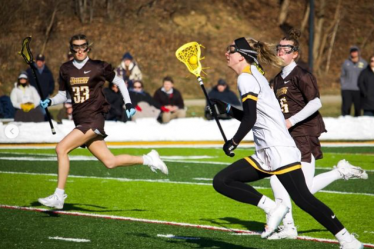Aspen Rush
Managing Editor
On April 12, Trans Queer People of Color (TQPOC) and Queer Student Union(QSU) invited Women, Gender and Sexuality Studies Professor Dr. Natasha Bissonauth to discuss the history of Pride. Pride month, held every June, celebrates LGBTQ+ history and culture. The College created their own rendition of Pride, celebrating for one week every spring. Harry Susalla, sexuality and gender inclusion programming intern and QSU liaison for TQPOC, organized and led the event. Students, faculty and alumni gathered virtually to discuss the history and modern implications of Pride.
Bissonauth began her discussion by addressing the multiplicities of queer history, insisting that there is not simply one narrative of queerness. However, Bissonauth used the 1969 Stonewall Riots as a jumping off point for discussion, as the events of Stonewall launched the Gay Liberation Movement to the forefront of American politics. Police raided the Stonewall Inn in lower Manhattan, one of the few places LGBTQ+ individuals could be openly queer at the time. The inn was owned by the mafia, who were able to pay off police in exchange for their continued operation. Bissonauth pointed out that to be queer is to have a precarious existence; although it was not illegal to be queer, it was prohibited to act it. The Stonewall Inn was one of the only places patrons were able to “kiss queerly, dance queerly, dress queerly.”
As was a regular occurrence, police raided Stonewall Inn on June 28, 1969, terrorizing the queer individuals within. Police forced trans and gender-nonconforming individuals into the bathrooms to check if they were wearing at least three items of gendered clothing that aligned with their sex assigned at birth. On this occasion, the patrons of Stonewall fought back, throwing coins at police. Dr. Bissonauth quoted scholar Eric A. Stanley’s description of the riots: “In a blast of radical collectivity, trans/gender-non-conforming folks, queers of color, butches, drag queens, hair-fairies, homeless street youth, sex workers and others took up arms and fought back against the generations of oppression that they were forced to survive.” Dr. Bissonauth asked us to consider the identities of those in the riot. As Stanley points out, they exist at the intersections of marginalized identities. Because of this, Bissonauth argued, “they couldn’t be so easily seduced by the structures that held out normativity as a reward.”
“Trans militancy,” Dr Bissonauth went on to say, “illuminated that non-normativity could be used for revolutionary shifts in social order.” Liberation was not interested in the notion that “if they just treated gays better, everything would be fine,” but rather radical liberation insisted that society rethink the order altogether and dismantle the entire structure.
Key figures like Marsha P. Johnston and Sylvia Rivera were explicit in pointing out that the riots were motivated by police brutality and that the protestors maintained radical, revolutionary politics.
Gay liberation was not and is not a single-issue movement. “This history of radical queer politics had to disappear for gay rights to be had,” Dr. Bissonauth said. “Progress is never without a backlash and it is never linear… It comes with the narrowing of queer politics, narrowed to the narrative of sexual freedom and sexual identity.”
In closing remarks, Bissonauth said, “We remember the dream of a social revolution that has yet to be realized.”
Susalla, opened the floor to questions, beginning with his own: “Why do you think so much of the queer agenda has been to be included rather than to queer spaces themselves?”
Bissonauth responded that radical change is difficult to implement, and that an intersectional, multi-dimensional project is much harder to follow through with and requires capital to accomplish.
Sharah Hutson ’20, shifted the discussion towards queer self-care, raising a fitting question as the vast majority of attendees were queer. They asked, “Do you have any tips for sustaining yourself and maintaining hope with the knowledge that we won’t be alive for Black liberation and queer liberation?”
Hutson offered their own suggestion: radical rest in the face of capitalism. Bissonauth agreed and discussed her own experience of self-care during the COVID-19 pandemic. She pointed to disability studies for inspiration. She further suggested that we consider politics of care as a model.
While this year’s pride events have taken a different form than previous years, Pride still sets a welcoming precedent for queer students. Susalla said, “Pride week gives opportunities for queer student to feel proud, build community and to show the entire school that we exist on this campus. Even if all students don’t attend events, the simple presence of Pride week shows that students are supported.”

